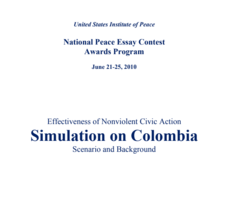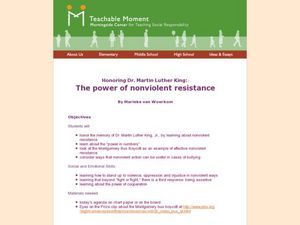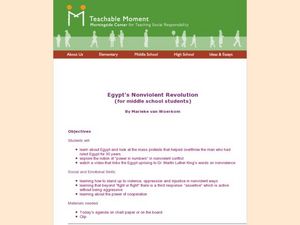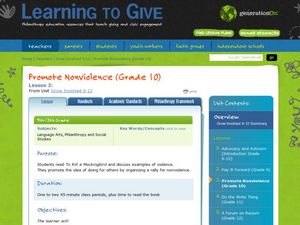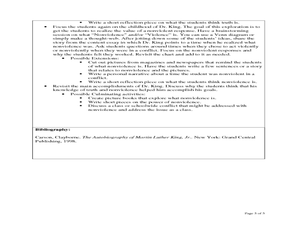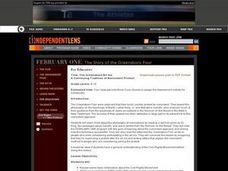National Endowment for the Humanities
Martin Luther King, Jr. and Nonviolent Resistance
Was nonviolent resistance the best means of securing civil rights for black Americans in the 1960s? For this highly engaging and informative lesson, your young historians will closely analyze several key documents from the civil rights...
C3 Teachers
Civil Rights: What Made Nonviolent Protest Effective during the Civil Rights Movement?
Sit-ins and boycotts, marches and speeches, songs and demonstrations were hallmarks of nonviolent protest of the civil rights movement. Young scholars research primary and secondary source documents to determine what made nonviolent...
US Institute of Peace
Effectiveness of Nonviolent Civic Action Simulation on Colombia
With new leadership comes new hope! After years of violence, the people of Colombia elect a new president ... could this mean an end to conflict? Civics scholars take part in a large group role-playing exercise designed to illustrate the...
PBS
Breaking the Code: Actions and Songs of Protest
Ezell Blair, Jr., David Richmond, Franklin McCain and Joseph McNeil changed history. Their sit-in at the lunch counter of the Woolworths in Greensboro, North Carolina on February 1, 1960 became a model for the nonviolent protests that...
Curated OER
The Power of Nonviolent Resistance
Students discuss the power of nonviolent resistance in terms of Dr. Martin Luther King and the boycotts that he led. In this nonviolent resistance lesson plan, students discuss their thoughts of nonviolent resistance and how they can use...
Curated OER
Gandhi's Voice: Writing as Nonviolent Resistance
Ninth graders identify how Mahatma Gandhi used writing as a means of nonviolent communication. In this nonviolent resistance lesson, 9th graders watch a film about Gandhi as a writer and identify characteristics of nonviolent activism....
Curated OER
The Art of Protesting
Students view various images to examine different types of protest Americans have used throughout history, and explore ways in which protest can produce change for better or worse.
Curated OER
Martin Luther King Jr. and Nonviolence
Using the book, Martin's Big Words, learners will discover the life of Dr. Martin Luther King Jr. Vocabulary is identified throughout the story by using several his famous protest speeches as examples. Class discussions on racism, during...
Curated OER
Egypt's Nonviolent Revolution
Students explore the nonviolent protests of the Egyptians. In this current events lesson, students watch a video and read articles about the 2011 Egyptian uprising. Students compare the Egyptian protest to the protests of the American...
Curated OER
Promote Nonviolence
Take a look at the topic of violence as seen in Harper Lee's To Kill a Mockingbird. Discuss together the values that Atticus holds and brainstorm ways to combat violence in a similar manner to what he portrays in the novel. Get your...
Curated OER
Youth Participation in Nonviolence
Students explore the use of nonviolent resistance. In this social justice lesson, students listen to their instructor present a lecture on Mohandas Gandhi and Martin Luther King, Jr. as well as the Apartheid Movement in South Africa.
Center for Civic Education
The Power of Nonviolence: Music Can Change the World
Here is a fantastic activity through which class members discover how music has the ability to influence others in a meaningful way. After reviewing selected pieces and modern-day protest songs, learners will research other songs that...
Curated OER
Evaluating Nonviolence as a Method of Social Change
During a lesson on Dr. Martin Luther King, Jr, the Civil Rights Movement, and/or nonviolent resistance, students can gather their thoughts in this activity. The questions cover Dr. King's philosophy of nonviolence, and two opinion...
Curated OER
Can Forgiveness Lead to Nonviolence?
Tenth graders determine if forgiveness can lead to nonviolence. In this nonviolent resistance lesson, 10th graders discuss the concept of forgiveness and read examples of the forgiveness that Gandhi granted. Students write letters of...
Curated OER
Dr. Martin Luther King, Jr.: Childhood Stories of Truth and Nonviolence
Fifth graders explore the childhood of Martin Luther King, Jr. In this nonviolent resistance lesson plan, 5th graders listen to their instructor present a lecture regarding the details of King's early life and how that life contributed...
Curated OER
Nonviolence as a Tool for Change Lesson 2
Young scholars explore nonviolent protest. In this Civil Rights lesson, students read the essay "Nonviolence and Racial Justice." Young scholars present the information they gleaned from the essay to their classmates in order to consider...
Curated OER
Nonviolent Protest Around the World
Twelfth graders complete research that exposes them to examples of nonviolent protest throughout the modern world. In this nonviolent protest research lesson plan, 12th graders discover information about signification nonviolent...
Curated OER
The Greensboro Sit-Ins: A Continuing Tradition of Nonviolent Protest
Students watch a video about nonviolent protests during the Civil Rights Movement. They discuss and write about the Greensboro sit-ins while deciding the effectiveness of this type of protest.
Facing History and Ourselves
Eyes on the Prize Lesson 2: Six Steps for Nonviolent Social Change
Young scholars explore the concept of nonviolent protest. For this Civil Rights lesson, students examine the attributes of nonviolent protest as they investigate the student protests that took place in Nashville in 1960-1961. Young...
Curated OER
Nonviolent Leaders
Students compare the life of Gandhi and other nonviolent leaders. They identify qualities and behaviors of nonviolence. They synthesize the information they research about world leaders and the impact they had.
Facing History and Ourselves
Eyes on the Prize Lesson 1: The Philosophy of Nonviolence
Students explore the concept of nonviolent demonstration. In this Civil Rights Movement activity, students investigate examples of injustice and discuss the philosophy of nonviolence fueled by leaders of the movement. Students apply...
Curated OER
Cartoons and Protest
Students examine political cartoons from 1774 through today, determine their meanings through analysis and discussion, and create their own political cartoons focusing on historical issues studied in class.
Curated OER
Committing to Nonviolence: A Lesson from Viva La Causa
Learners examine the social change movements of the American 20th century. In this nonviolence lesson, students research the work of Mahatma Gandhi, Martin Luther King, Jr., and Caesar Chavez. Learners compare and contrast the social...
Curated OER
Civil Rights Leader: Rosa Parks
All humans should have civil rights, but that wasn't the case in Alabama. This biographical presentation shares information about the life and inspiration that Rosa Parks brought to the Civil Rights movement. It explains her thoughts,...




